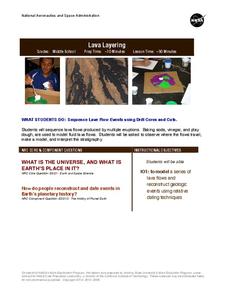Curated OER
Sandwich Stratigraphy
Two activities are included in this resource. In the first, junior geologists model sedimentary rock layers, apply the Law of Superposition, and demonstrate folding and faulting of the Earth's crust. The model is technically a sandwich....
Curated OER
Take a Stab!
Your geology class practices taking core samples of a potato to examine the stratigraphy. This is a terrific modeling lesson that helps youngsters visualize strata that cannot be seen from the surface of the ground. The directions...
Curated OER
Mapping and Excavating a Jello Mold
Students simulate how archaeologists excavate sites by "searching" their own site in the form of a Jello mold. They use a grid to map the objects in the Jello mold as well as looking at three layers of Jello to understand stratigraphy...
Curated OER
Developing a Local Stratigraphy
Students examine rock strata for the distribution, deposition, and age of sedimentary rock. They describe rock types in a variety of outcrops and construct a regional stratigraphy.
Curated OER
Understanding Lava Layers
Seventh graders view "Volcano" by National Geographic Video. They experiment with baking soda and study lava flow. They describe volcano and earthquake patterns. They analyze weather and climate changes and how they relate to the natural...
Curated OER
Stratigraphy -- Layers of Time in the Earth
Students are introduced to the process of stratification. Using the internet, they read about the Richard Beene archeological site near San Antonio. Using a map, they color code the different layers present at this site and answer...
Curated OER
Garbage Can Archaeology
Students explore the use of stratigraphy to date objects by sorting the material in the wastebasket. They make a list of actual items from the garbage can and their possible uses and categorize the artifacts.
T
Curated OER
Kincaid Shelter Stratigraphy
Seventh graders illustrate how archeologists use stratigraphy to help determine environmental changes in a specific area since the Pleistocene Era, and to point out that these changes have affected the animals living in that area.
Curated OER
Relative Dating in Archaeology
Students create a timeline that explains how ancient cultures used artifacts. In this Relative Dating in Archaeology lesson plan, students examine artifacts and draw conclusions about their origins. Then students analyze antiquated...
Curated OER
What's in the Soil?
Second graders create stratified soil levels using pictures. In this earth science lesson, 2nd graders identify "artifacts" from 3 historic eras and divide them into 3 soil levels. Then they draw their own multi-level soil profile and...
Curated OER
Take a Stab!
Young scholars construct an experiment to test the rigidity of compressed air and its strength. In this earth science lesson plan, students are divided into groups, and by putting their thumb over the end of a straw, use the compressed...
Curated OER
Transparent Shoebox Dig
Take this simulated archaeological dig one layer at a time with your young pupils to encourage observation, critical thinking, and careful attention. Using a transparent box full of layers of sand and artifacts, pupils examine the...
Curated OER
Layer Cake Archaeology
Excavating cake? Why not! Kids spoon into some layers and artifacts during this tasty hands-on activity. The cake, a simulated archaeological dig, is the object of observation and discussion.
Curated OER
Artifacts 1: What Can We Learn From Artifacts?
Sixth graders are introduced to artifacts and explore an online archaeological site to connect clues about how people once lived. In this deductive reasoning lesson, 6th graders participate in the stratigraphy game on Kids Dig...
Curated OER
Relative Age Dating
Modeling dough and paper cutouts in science class? Learn about how relative age dating concepts, like the Law of Superposition and cross-cutting relationships, can be used to describe the formation of sedimentary layers.
DiscoverE
Core Sampling
Simulate soil sample assemblages. Individuals create soil layers in a cup. They then use straws to collect core samples from these layers. What information can they glean from the core samples, I wonder?
Curated OER
What Can We Learn from Artifacts?
Students examine how artifacts are discovered and explore their significance as it pertains to gathering important information. In this artifacts lesson plan, students obtain knowledge about the way artifacts are excavated and examine an...
Curated OER
Stratigraphy and Cross-Dating
Students interpret archaeological strata using the law of superposition. They apply cross-dating to determine the age of other artifacts.
Curated OER
Ocean Stratigraphy Challenge
Students are asked to explain the sequence of rock and sediment types and to devise an experiment to test this hypothesis. It is intended for students with some prior knowledge of oceanography, sedimentary geology, and plate tectonics...
Curated OER
Relative Dating In Archeology
Students generate a time line, interpreting the ways in which past peoples may have used the artifacts at their disposal. Students also develop a poster showing a theoretical stratigraphic deposit, and then analyze the cultural materials...
Curated OER
Site Formation In Archaeology
Students look at the findings of a Hopi Indian dig site in order to reconstruct the sequence of events that occurred in the past. They examine the stratigraphy while making multiple hypothesis about the artifacts and their locations at...
Curated OER
Artifacts 1: What Can We Learn From Artifacts?
students will learn about artifacts-what they are, how they are initially buried and then excavated. They participate in an online game and called "Stratigraphy" and participate in the "If Trash Could Talk" activity page.
Curated OER
Layers of Rock
Juvenile geologists drill clear plastic straws down into a playdough sedimentary rock model, pulling out sample rock cores. As they analyze their cores, they apply the law of superposition and discover that originally horizontal layers...
NASA
Lava Layering
Take the old baking soda and vinegar volcano to the next level by using it to study repeated lava flows over time, examine geologic features on Earth and Mars, and speculate about some of the formations on Mars.

























